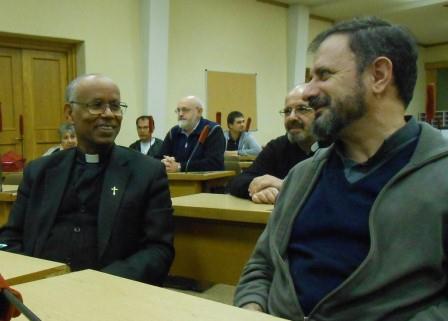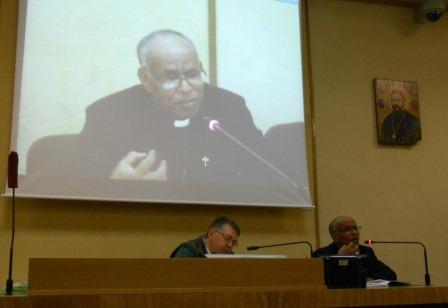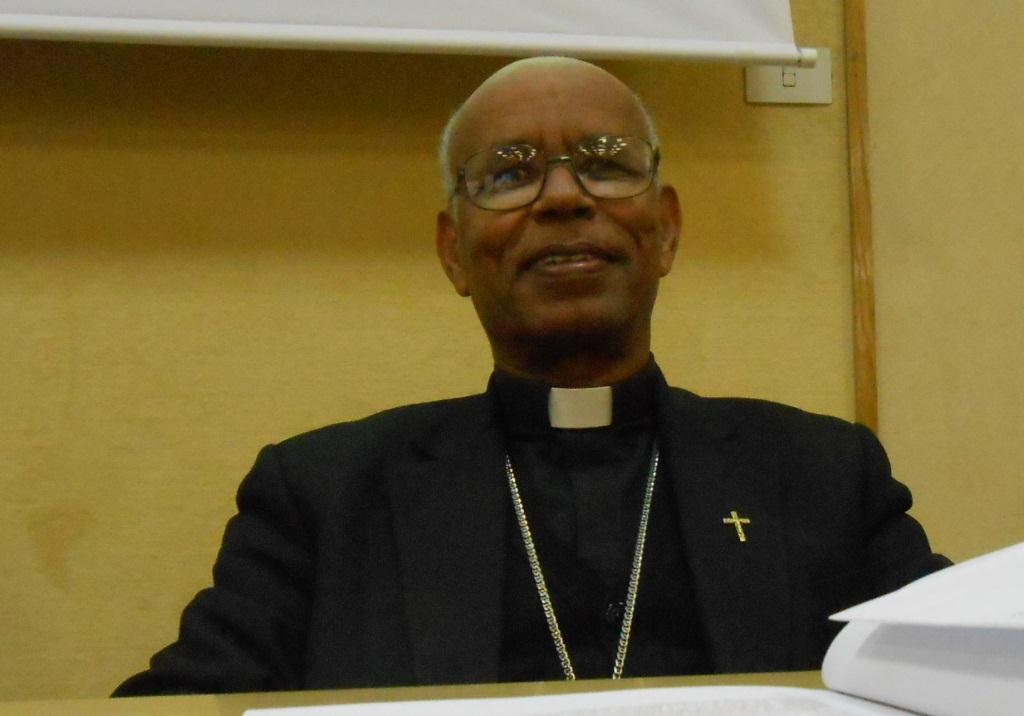
Bishop Menghesteab Tesfamariam and Fr. Enrique Sánchez González.
Bishop Menghesteab underlined that the Synod had the purpose of finding new methods of evangelization in order to speak to the world of today, as the title of the Synod itself stated: “The New Evangelization for the Transmission of the Christian Faith.”What is important and the synod fathers emphasized is the ardor and the new attitude in presenting the Gospel, besides the means adequate to the new situation in the world. During the entire duration of the Synod – said the bishop – there were about 400 presentations, some of great theological and spiritual intensity.” The reunions of minor circles, organized by language groups, were important in order to give practical consistency to the ideas that emerged from the Synod. The minor circles presented 400 Propositions, eventually reduced to 58 by a special commission and presented to the Holy Father who will use them to prepare his Post-Synod Exhortation.
Bishop Menghesteab then presented and commented on some points of the final message of the Synod and of the Propositions. A novelty of the message to the people of God, in relation to previous messages, is the final address to the Churches on the various continents.
In the Propositions, Bishop Menghesteab underlined how “cities and their cultures are considered places of new evangelization and how important is the credibility of the Church in the new evangelization, especially through the bishops and the priests, as authentic witnesses of the Gospel.”
The presentation on the Synod continued with questions for the eparch. In answering, Bishop Menghesteab said that the novelty of this Synod is not to be found in great proclamations or in absolutely new decisions, but “in the encouragement given to the bishops in this time of crisis;” he also pointed out how “a certain relativism in the Church weakened its mission of evangelization.”Even though the mission ad gentes was not at the center of the Synod’s debate, some of the participants remarked that the commitment to evangelize ad gentes preserves its importance and needs a new push.
About this we propose here the text “In scriptis”, not given in the Synod hall, of the Comboni bishop of Asmara:
“At the beginning of the Second Assembly for Africa of the Synod of Bishops the Holy Father warned us about the virus that are openly at work in order to weaken the Christian faith in the entire African continent, namely secularism and the proliferation of sects. This is right because they generate respectively relativism and fundamentalism. It is therefore important that in our program of New Evangelization we identify their roots and cure all that they have contaminated within us, in our families, in the parishes and dioceses. They are clearly enemies of our faith, and we know it. But where do they come from? Are we sure that they are not born of our mediocrity and of our lack of coherence as followers of Jesus Christ? Many of those who are unhappy with this type of faith we live, even though we proclaim to be good Christians, may have chosen to follow the way of relativism-indifference or of the emotions and fundamentalism! If we were more loyal and credible in our Christian life, not only would we avoid that people leave the visible Church, but we would be able to attract many new members, like the first Christians of the Acts of the Apostles who “every day together went to the temple and broke the bread at home, eating with joy and simplicity of heart, giving glory to God, and enjoying the esteem of the people. Meanwhile every day the Lord was adding to the community those who had been saved.” (AA 2, 46-48).
It is possible to be deeply religious and at the same time lack faith.
Naturally this is the third and most urgent challenge for us, who wish to start on the path of New Evangelization. If truly we want to be sincere with ourselves, we must admit that we do not match what we profess. And this has been, and still is, the greatest enemy of our faith. This is why at the end of the Sermon on the Mount, in the Gospel of Matthew, Jesus says clearly: “Not those who say: Lord, Lord will enter the kingdom of heaven, but those who do the will of my Father who is in heaven” (Mt 7,21) In transmitting our Christian faith with the New Evangelization we must make sure that people will listen to the Word of God and follow it faithfully. We need to eradicate this mediocre attitude from ourselves and from our communities.”
Here below we give some links in English and Italian that contain the message of the Synod and the 58 Propositions. The Propositions have been written only in English.
Messaggio del Sinodo in Italiano
Message of the Synod in English
Propositions in English

 Questo sito utilizza cookie, anche di terze parti, per inviarti pubblicità e servizi in linea con le tue preferenze. Se vuoi saperne di più o negare il consenso a tutti o ad alcuni cookie clicca qui. Chiudendo questo banner o cliccando qualunque suo elemento acconsenti all'uso dei cookie.
Questo sito utilizza cookie, anche di terze parti, per inviarti pubblicità e servizi in linea con le tue preferenze. Se vuoi saperne di più o negare il consenso a tutti o ad alcuni cookie clicca qui. Chiudendo questo banner o cliccando qualunque suo elemento acconsenti all'uso dei cookie.





